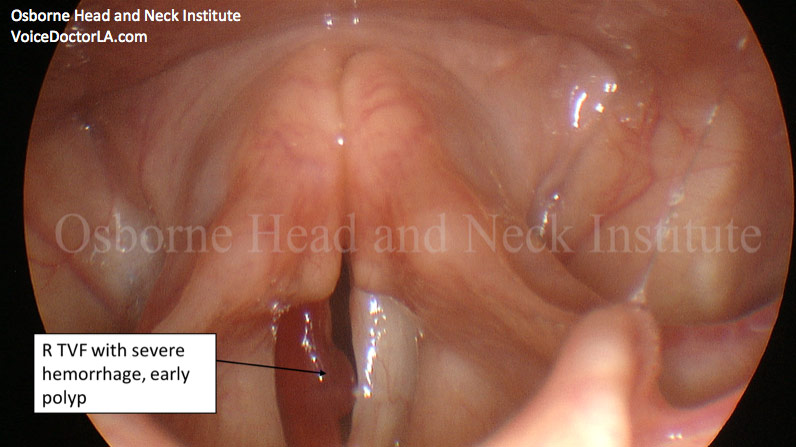- Question: How do the ingredients in e-cigarettes and vaporizers affect respiratory health? - August 16, 2019
- Bad Technique and Vocal Injury - January 9, 2019
- Is Edible Marijuana Dangerous for the Voice? Myths Dispelled - December 18, 2018
- Surprise! You have a hemorrhage - January 31, 2018
- Graves’ Disease: Treatment Overview - September 25, 2017
- Adele and the Stigma of Vocal Injury - July 11, 2017
- Vocal Curbside Consult: How does the thyroid affect the voice? - May 16, 2017
- Vocal Curbside Consult: How do hormones affect the voice? - May 3, 2017
- Vocal Curbside Consult: How do emotion and stress affect the voice? - April 17, 2017
- Vocal Curbside Consult: Vocal Recovery After Illness - April 7, 2017
The patient is a 40-year-old female who noted voice changes after choking. She was drinking water the night before and noted it went down the wrong pipe. She only coughed for 1-2 minutes but had a sore throat afterwards and felt her voice was different. She has a large stadium engagement tomorrow and so she called her regular ENT who prescribed her steroids over the phone. However, she was concerned because of how important the performance was and so she sought a second opinion to have her vocal folds examined.
She notes a loss of her vocal range as well as a mildly sore throat. She states that she is only singing 5-6 songs and that they are in an easier part of her range so she feels she can “push through.” She has been resting her voice since onset yesterday.
A general physical exam revealed her to be in good ENT health. Videostroboscopy was performed and demonstrated the following:

Based on the above findings, a diagnosis of severe right vocal fold hemorrhage was made. It also appears that in the one day since onset of her symptoms, by pushing through this hemorrhage to speak she has started to form a polyp on the right vocal fold. Treatment has been implemented and follow up will determine if the polyp persists.
Had this patient “pushed through” and used steroids, as she had been inclined to do, the polyp would undoubtedly have formed and resulted in the need for vocal surgery.
This case highlights several important points:
- Singers should not start medications or treatments to “get through” a gig without videostroboscopy first. The hoarseness from laryngitis (which will respond to steroids and can be gently worked through) and hoarseness from a hemorrhage may sound similar. However, singing on a hemorrhage will virtually guarantee a future injury requiring surgery.
- There is no such thing as “working around” injuries. The vocal folds are involved in every sound that is made. Singing with this hemorrhage would require significant force and cause permanent damage.
- Singers should resist the temptation to start steroids when hoarse. The proper diagnosis is critical and must be established first. Listening to the voice alone cannot replace the examination.
This further reinforces the theory that most vocal cord injuries (polyps, etc.) begin to form during a hemorrhage. Coughing triggered this patient’s hemorrhage but hemorrhages also occur when singing while sick, shouting, sneezing or experiencing any forceful vocal contact. It is evident that using her voice just for speaking and only for one day has resulted in early formation of a polyp due to the underlying hemorrhage. This underscores the importance of an evaluation for singers as soon as hoarseness strikes.
To learn more about Dr. Reena Gupta or voice evaluation and treatment, please visit www.voicedoctorla.com.



